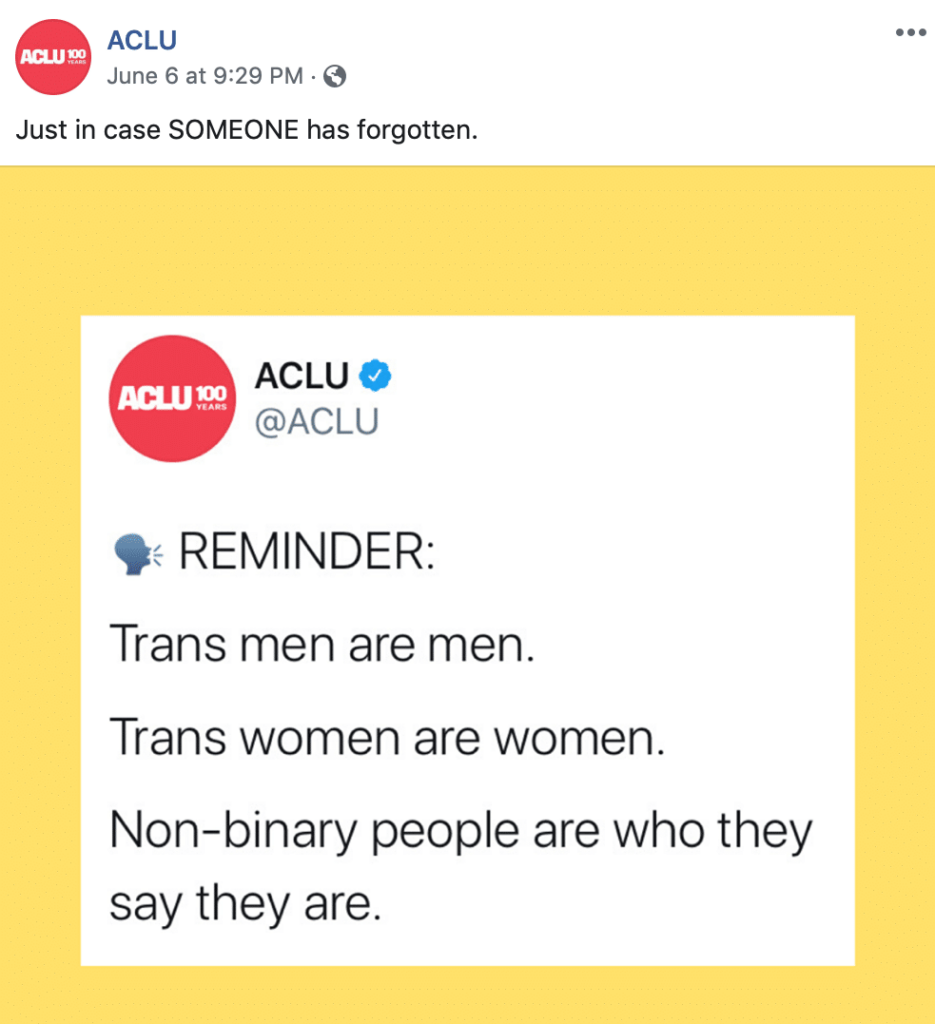Daniel Radcliffe’s denunciation of J.K. Rowling fails to address her ideas, condemn abuse, or even mention the people apparently being erased by ‘women’.
The Bodily Function Which Must Not Be Named
Daniel Radcliffe knows some things about menstruation. Recently he wrote a statement assuring us that the correct word for those who experience periods is not “women” or “girls,” but “people who menstruate.” However, when he told us this, he didn’t actually tell us this. He never used the word “menstruation,” or “period,” or “blood,” or any related word. There was no mention of clots, or cramps, or dysmenorrhea, or endometriosis. He did not name the “people who” experience these things.
Instead, Radcliffe did name author J.K. Rowling, who recently came under fire for stating the controversial opinion that the word “woman” is still of use, and that this now-contested term may even provide a more appealing way to describe human beings than “people who menstruate,” or the more streamlined “menstruator.” But while Radcliffe invoked Rowling’s name, he did not acknowledge her ideas, which she has expressed publicly in a number of tweets and in a recent essay. Instead, he opened his statement by simply insisting that there is no “in-fighting” between him and Rowling, without mentioning why anyone might think there is. He anticipated that “certain press outlets” might seize on the opportunity to report on a conflict between Radcliffe and Rowling, which they promptly did. The Guardian, the Independent, and the Times all referred to a “row” between Rowling and Radcliffe.
On social media, many enthusiastically shared Radcliffe’s statement, but I have yet to see any of Radcliffe’s fans mention that he both failed to identify the topic at hand and neglected to consider Rowling’s ideas about it. In 2020, it seems, if someone mentions Rowling, however obliquely, and with even the slightest hint that they disapprove of her for some reason they need not even state, they can count on being showered with unreserved praise.
The Menstruators Who Must Not Be Named
There is more that is not mentioned. The third sentence of Radcliffe’s statement asserts, “Transgender women are women.” Curiously, he does not go on to say, as anyone familiar with scripture would expect, “Transgender men are men, and nonbinary people are who they say they are.” In fact, there is no mention of transgender men or nonbinary people anywhere in Radcliffe’s statement, even though the ultra-specific term “people who menstruate” is intended to accommodate these groups—people who have periods who do not identify as women.
Why does Radcliffe choose this occasion to remind us that trans women are women? Trans women do not menstruate. This is why it is now considered exclusionary for those women formerly known as women to claim that menstruation is related to being a woman. That’s pretty much the point of terms like “menstruator.” By intoning “transgender women are women,” Radcliffe associates women, and only women, with the expression “people who menstruate.” This is exclusionary and transphobic. Not all women have periods, and not all who have periods identify as women.
Among those who cheered Radcliffe, I have yet to see anyone call out Radcliffe for his exclusionary and transphobic refusal to acknowledge “people who menstruate.”
The Silencing That Must Not Be Spoken Of
There is yet more that is not said. Rowling has been on the receiving end of misrepresentation and verbal abuse for over two years, simply for suggesting that women formerly known as women have the right to discuss the word “woman.” For advocating free speech, she has been derided, slurred, and even threatened.
Into the fray saunters Daniel Radcliffe, who, without any apparent effort, scribbles a few words calculated to score points with his base. His four-word magic incantation, “transgender women are women”—again, this is transphobic and exclusionary of people who menstruate—ignites passions and encourages continued demonization of Rowling. Readers need not even know what Rowling has said, for Radcliffe’s magic spell sanctifies him and positions him securely on the moral high ground. Rather than discuss menstruation, or Rowling’s point of view, he describes the discrimination young transgender and nonbinary people have self-reported. It goes without saying that this should be eradicated, but it is a diversion. Rowling, the prop he uses to display his righteousness, is at this very same moment being mercilessly bullied online and in the press. By ignoring this, by saying her name only to turn away from her, by making the sinner a foil to his own saintliness, he lazily enables those who would consign her to the online ducking stool.
Rowling has taken pains to be considerate and measured, just as women formerly known as women are still expected to do. Nevertheless, she has been described as “hateful” and “transphobic.” She has been accused of saying trans people “don’t exist.” Rowling has been called a “bitch,” a “cunt,” a “whore” (also “hoe”), and even—gasp—“a Karen.” (In reality, the offense seems to be not that Karen has demanded to speak to the manager but that she is the manager.)
As expected, Rowling is also called a “TERF.” (Rhymes with “serf.”) Proponents of “letting people be who they are” have proposed that “TERFs” like Rowling deserve to be physically assaulted or killed. One TERF-hunter calls upon a well-known veteran to do the honors: “I’d pay to watch [Charlotte] Clymer put on her army camo and shoot the TERF.” Another goes for the DIY approach: “Smack JK Rowling so hard I give that fool a lighting scar on HER forehead.” Rowling has been challenged to a duel by Tara Flik Wolf: “Oi JK rowling ow about you meet me outside! Hyde park! Lets fucking have it you cunt!” (In 2018, Wolf was convicted of assaulting Maria Maclachlan in Hyde Park in London.)
The demeaning comments are not limited to the blue circle of hell known as Twitter; otherwise reputable news outlets have also adopted the term “TERF.” Mainstream publications insist that this is not a misogynistic insult but a neutral term, an acronym radical feminists invented and applied to themselves. No matter how many times we insist that we consider this term a slur, no matter how many times we see “TERF” joined to “bitch” or “cunt,” we are informed that we have misunderstood, that this term is not intended to demean us. We really do like it, we are told. And a minute later we receive, for the 83rd time, a cartoon image with a gun pointed at us, an anime character threatening, “Shut the fuck up, TERF!”
The mainstream media has also joined in telling Rowling to “STFU.” The Washington Post says it directly in an article titled, “J.K. Rowling’s Transphobia Shows It’s Time To Put Down The Pen.” Molly Roberts informs us that Rowling is flailing; she’s a bigot; she’s even—middle-aged! And therefore obsolete. Other prominent publications have described her tweets and essay as “transphobic” or “anti-trans.” This is eerily reminiscent of how second-wave feminists were described as “man-haters.” In the 1970s, we were said to hate men. Nowadays we are said to hate trans people. Fifty years ago, we learned to speak about our bodies. Nowadays, we learn how not to.
Major advocacy organizations have issued patronizing “reminders,” as if Rowling has forgotten her lines. The Human Rights Campaign laments, “We see JK Rowling is at it again. Helpful reminder: If your feminism isn’t trans-inclusive, then it’s not feminism.” A GIF of Emma Watson as Hermione is included for no extra charge, mocking the author with her own invention.
The American Civil Liberties Union goes beyond condescension, suggesting a re-education is in order for the unrepentant heretic, ominously naming “SOMEONE” who dares to say she exists:

The Word That May Be Spoken Only By Those To Whom It Does Not Apply
Once upon a time, the now-controversial word “woman” served to describe people like Rowling, whether they liked it or not. Now Rowling is denounced for using the word, while Radcliffe is lauded for using the same word. Note that he needs the older meaning of the word in order to assert the newer meaning. Without the women formerly known as women, how could he tell us that trans women are women?
Daniel Radcliffe tells us who counts as a woman, suggesting that there is no relationship between the physical body and the language used to describe it. However, for some reason, a disproportionate number of the tweets debasing Rowling refer to what used to be called the female body. And, again, we hear about her age. Some even mention menstruation, as in “I doubt you menstruate. I bet you’re all dried up down there.” And “I bet her dry ass old pussy probably hasn’t bleeded in years.” (Well, she is 54, so that’s not a bad guess. But this is more transphobia. Not all women are menopausers.)
Online, some women talk about their own bodies and how they would like to meet up with Rowling to experience their shared womanhood, as in, “JK Rowling, choke on this…I’m a bitch with a dick & I’ll bleed on your tits!” (“Suck my girldick” is its own Twitter genre, practiced by not only by anonymous pests but by a member of the New York State Democratic Committee.)
Let’s be clear about what is happening here: a distinguished writer in middle age, a woman of the sort formerly known as women, advocates for the word “woman,” and she is threatened with assault by a woman’s penis.
This is not just some outlier troll. First, there are a lot of them, and second, this degradation is of a piece with the more genteel, and more conventionally spelled, targeting of Rowling with which Radcliffe associates himself.
A woman of the sort formerly known as women is compelled to change her language, but there are no limits placed on what can be said to her.
“TERF” is said to be a neutral descriptor, but the word “woman,” when used by women formerly known as women to describe themselves, is considered hateful.
People are “who they say they are” and should be addressed according to their wishes, excerpt for “TERFs,” who are to be called . . . “TERFs,” whether they identify as such or not.
It is inclusive to acknowledge that not all women menstruate and that some women have penises. But it is bigotry to associate the word “woman” with experiences such as menstruation and childbirth.
Above all, women are being coerced into silence. The mere suggestion that we might like to discuss the language applied to us meets with reproach.
Radcliffe’s statement has been applauded online by people like me: college-educated, feminist, middle-aged American women of the sort formerly known as women. I haven’t seen any of them mention the gleeful dehumanization of Rowling; nor I have I seen any of them object that Radcliffe has remained silent about the abuse, or that it was taking place as he crafted his “response.” While he is not directly responsible for others’ treatment of Rowling, he is responsible for contributing to a hostile climate, and not just among anonymous Twitter trolls.He is responsible for what he does and does not say, and for what he does and does not know (or pretends not to know).
Prominent, popular women have styled themselves Mean Girls and have joined in the fun: Jessica Valenti and Dana Schwartz passed around a meme using Radcliffe’s image to tell “TERFs” to “shut the fuck up,” and Serena Sonoma celebrated that some Hachette staff are refusing to work on Rowling’s book. Hannah Gadsby, whose show Nanette fearlessly addressed Picasso’s misogyny and inhumanity, sneered, “J.K. Rowling does not matter nearly as much as she thinks she does.”
She Who Must Be Erased
It’s not uncommon for readers who grew up with the Harry Potter books to describe how deeply immersed they became in Rowling’s fictional world. Mallory Yu of National Public Radio “identified with” the characters and now feels let down, even “invalidated,” as if the magic of the printed words has been dispelled by Rowling’s insistence on continuing to say things. Ironically, Yu scolds Rowling for using woman-centered language while demanding that she play the role of self-sacrificing mother by continuing to indulge the Hogwarts fantasy decades after graduation.
There are, to be sure, benign ways in which readers may feel that they “own” a character or story. But this is a discomfiting scenario: a woman of the sort formerly known as women dares to talk about how babies are made to the former children who read her books, and these beneficiaries of her imagination bemoan how inconvenient she is. Molly Roberts instructs Rowling to disenfranchise herself: “Maybe it’s time to let go. Give the Harry Potter books over to those to whom they have meant, and continue to mean, so much.”
A conspicuous number of online comments suggest that J.K. Rowling did not even write her books, as in Riley J. Dennis’s claim that the series “actually does not have an author.” (5400 retweets and 27,900 “likes.” A Google search for “death of the author” now brings up “J.K. Rowling” a good four lines before Roland Barthes.) Daniel Radcliffe, too, seems to like the idea that Rowling the author never existed.
The final paragraph of Radcliffe’s statement offers consolation to those who feel betrayed, who feel as though their experience of Rowling’s fiction has been sullied by Rowling’s continued existence. He assures fans that they may still be nourished by—well, by “the books,” “these stories,” and “the book that you read,” despite “these comments.” He doesn’t say whose books, whose stories, or whose comments.
The explicitly violent tweets and the contemptuous journalistic dismissals are unsettling enough on their own, and it’s troubling to think that Radcliffe’s failure even to address the matters at hand may have amplified them. But here he moves from omission to erasure. Whereas he began his statement by focusing on Rowling’s name and not her ideas, now he appropriates her ideas while refusing to utter her name. This final negation is pernicious in its own way. Radcliffe opened his statement with an acknowledgment of J.K. Rowling’s influence on his life, but just a few paragraphs later, he seems to have forgotten that he played Harry Potter in the movies based on the books rather than inventing Harry himself. At the same moment when Rowling is being “cancelled” by those who loved her books, as her former fans and even major publications demand that she surrender her agency and autonomy, Radcliffe steps in and arrogates the right to speak for “these stories.” He assures his base that they may still find meaning and solace in the books, despite the mortal sins committed by—She Whose Name Must Be Erased From The Covers Of Her Own Books. Chillingly, Radcliffe assures his readers that “nobody can touch” their experience of the books, implying that the unnamed, erased author has been purged entirely. How magnanimous of him. How inclusive.
In my online community, many have shared Radcliffe’s statement, but none have shared Rowling’s essay that occasioned it. I haven’t seen any complaint that Radcliffe fails to mention the trans men and nonbinary people who menstruate, or that he pretends not to know Rowling has already been fending off verbal attacks for years, or that he erases her name as he refers to “the books.” While gender identity has been rebranded as a free-floating essence entirely detached from the sexed body on which it was originally imposed, Radcliffe’s Harry seems disconnected from any creative mind or human consciousness whatsoever. Harry just is—until the arrival of Daniel Radcliffe, the arbiter who ensures that Harry can still be useful even after his creator has been discarded.
This disregard is familiar to those of us who used to be called women, whose authorship has long been subject to misappropriation and erasure. Some person, usually a member of some other group (is there a name for them?), takes credit for our work, denies our authorship, or takes it upon themselves to explain it for us. It’s almost like the women formerly known as women are an idea in these other people’s heads.
Daniel Radcliffe seems to have forgotten Harry Potter began as an idea in J.K. Rowling’s head. But he wants “women” to be an idea in his own.
For all its popular appeal and re-postings, “Daniel Radcliffe Responds” does not respond to what J.K. Rowling expressed, and much is communicated by what he did not say. Radcliffe did not acknowledge the terminological issue or the content of what Rowling said about it. He did not mention the “people who” are affected by the issue or even credit Rowling as an author of “these stories.” Nor did the thirty-year-old honor Rowling as an elder who carries significant wisdom and experience—and who just might know something he doesn’t about the word “woman” or the practice of menstruation. He expressed fervent opinions about who counts as a woman, but didn’t show respect for this woman. Perhaps it is Daniel Radcliffe, not J.K. Rowling, who should “put down the pen.”
I have not read the Harry Potter books or seen the movies; nor have I followed news about J.K. Rowling until fairly recently, but I understand that there is much to admire about her as well as her work. Unsurprisingly, she has had female-identified experiences, some of which she described in her essay. Her treatment in the wake of the essay seems to be female-specific too: as a woman in her mid-fifties, she is expected to be invisible and silent—to the point where she is disparaged even for naming herself and her own experience. She is told, by amateurs and professionals alike, that she is now irrelevant, and that she should therefore “STFU.”
If the topic were climate change, epidemiology, or economics, would such a lazy statement by a lay person such as Radcliffe be celebrated and the expert so belittled by those who pride themselves on their intelligence, critical thinking, and “inclusion”? Under what circumstances does anyone deserve to be degraded in the way Rowling has been?
I’ve referred to my friends and acquaintances who shared Radcliffe’s statement. I should add the disclaimer that my online presence is exceedingly modest and my sample size a mere fraction of a smidgeon of Daniel Radcliffe’s or Mallory Yu’s or Riley Dennis’s—not to mention J.K. Rowling’s. There are some who are speaking up publicly for Rowling, but the feeling in the air here in the United States among supposedly progressive people is that Rowling is “on the wrong side of history.” I have friends and acquaintances who enthusiastically cheer for Radcliffe, while those who are uneasy about his and others’ treatment of Rowling do not feel comfortable saying so under their own names. What sort of “history” does this portend?
To middle-aged women of the sort formerly known as women who have granted Daniel Radcliffe permission to speak for, or over, you: I implore you to ask yourselves why you are complimenting this young man for erasing J.K. Rowling—and us. This is not “the right side of history”; it’s the smug and savage face of patriarchy.








Posted by EddieT
20 July, 2020 at 10:29 am
Daniel Radcliffe is a fool. Another coward desperate to side with whichever opinion is trending. Imagine this: No Harry Potter No Radcliffe. One can only dream.
Posted by Eileen Higham
28 June, 2020 at 1:08 pm
I do not care about Daniel Radcliffe or his opinions. I do care about women who defend the rights of women. We are often silent when an onslaught hits us, I think this is why domestic abuse predominantly happens to women and that men feel they have the right to abuse with hateful language but women will make their opinions heard as they are in the UK and thank you JK Rowling for bringing the debate out into the sunlight.
Posted by Jane Bloore
28 June, 2020 at 7:47 am
Thank you for your forensic and merciless analysis of Daniel Radcliffe's inane 'reponse' to J.K.Rowling's teasing comment on that idiotic phrase 'people who menstruate'. I am sick and tired of women being denied the right to talk about their own bodies and experience by some men, however they wish to identify. Transwomen are irrelevant to any discussion relating to female bodies as they are biological males. In a sane world this truth would be recognised. Men are still free to talk about themselves as men, without routinely being accused of transphobia. If J.K.Rowling had gently queried a phrase like 'penis haver' (think cervix haver or birthing person for comparison) and suggested that there was a useful word already in existence for such a person - what would you have written then Daniel? Nothing I suspect, because it is only women who now are silenced for the sheer cheek of demanding the right to define ourselves. I'm 73 next month, so I suppose I could be described in the new language as a 'person who used to menstruate'. No, I'm a woman who has been through the menopause, a uniquely female experience, and no man has the right to take away my experiences as a woman, or the language In which I choose to describe them.
Posted by Shirley Wishart
21 June, 2020 at 1:47 pm
Needed to be said. For all is women formerly known as women.....